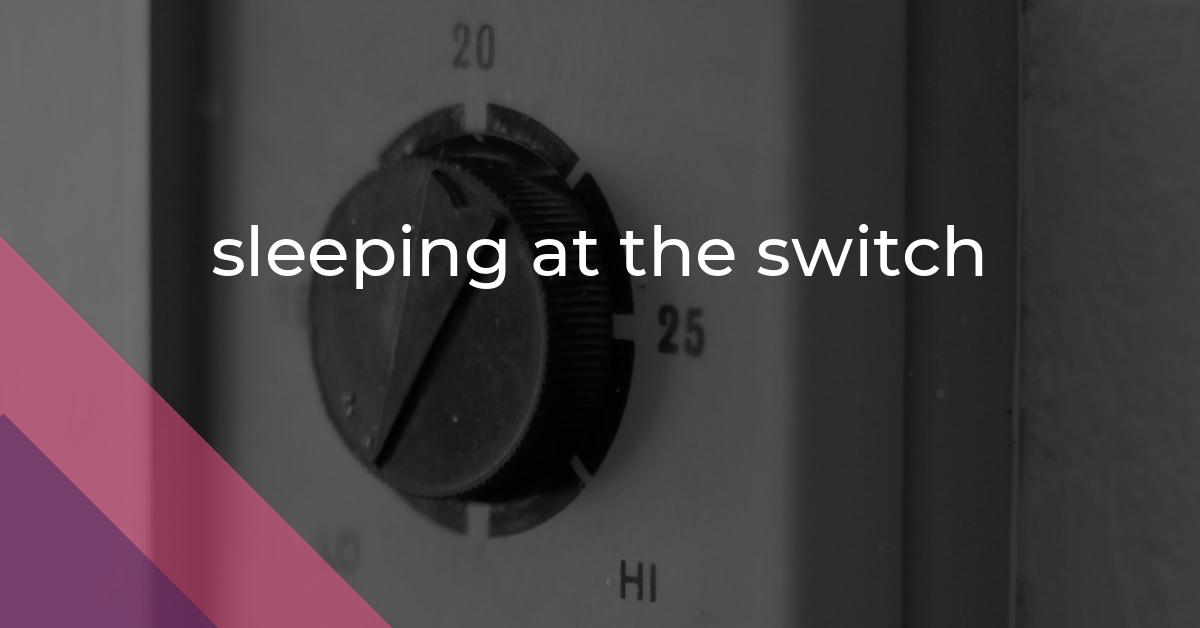sleeping at the switch: Idiom Meaning and Origin
What does ‘sleeping at the switch’ mean?
The idiomatic expression "sleeping at the switch" refers to someone who is not paying attention or is negligent in their duties. It originated from the railroad industry, where a switch is a device used to redirect trains from one track to another. If a switch operator fell asleep, it could result in a serious accident.

Idiom Explorer
The idiom "take one's eye off the ball" means to lose focus or become distracted from an important task or goal.
The idiom "take a nap" means to have a short sleep during the day, typically lasting for a brief period of time.
The idiom "switch on" means to activate or turn on. It is used to describe the action of starting a device or making something operational.
The idiom "switch off" means to lose interest or become disengaged from something mentally or emotionally, often resulting in a lack of attention or focus.
The idiom "sound asleep" means to be in a deep and peaceful sleep, where there is no disturbance or awakening from any external factors.
The idiom "slip someone's mind" means someone forgetting something unintentionally or failing to remember something that was important.
The idiom "sleep with" means to have sexual relations with someone. It is a euphemistic phrase used to describe intimacy or a romantic relationship in a figurative sense.
The idiom "sleep together" means to have sexual intercourse. It is a euphemistic expression that refers to the act of two people sharing a bed for sexual activity.
The idiom "sleeping policeman" refers to a bump or hump on the road intended to slow down vehicles. It is also known as a speed bump or a road hump.
Origins Unveiled
In the world of idioms, the idiom "sleeping at the switch" is commonly used to describe someone who is inattentive or neglectful of their responsibilities. This phrase originated in the United States during the era of railway transportation in the late 19th and early 20th centuries. Train operators played a crucial role in manually operating switches to guide trains onto different tracks, ensuring safe and efficient transportation. However, if an operator fell asleep while on duty, serious accidents or disruptions could occur. This literal meaning of the idiom emphasizes the importance of vigilance and awareness.
Metaphorically, "sleeping at the switch" extends beyond its literal roots to convey a sense of negligence or failure to act in a timely manner. Just as a train operator's inattention can lead to disaster, the idiom suggests that not taking prompt action or being negligent can result in negative consequences. This figurative meaning can be applied in various contexts, describing individuals who are not paying attention at a crucial moment, missing an opportunity, or failing to take action when required.
Similar to the idiom "sleeping at the switch" is the phrase "asleep at the switch." This phrase carries the same connotation of inattentiveness or neglect but uses the word "asleep" to emphasize the state of being unaware or unresponsive. Both idioms serve as reminders that being negligent or inactive can have negative outcomes.
An alternative idiom that is related to "sleeping at the switch" is "catch napping." This phrase conveys a similar idea of being inattentive or unprepared. It suggests that someone has been caught off guard or surprised because they were not paying attention. Just as a train operator who falls asleep can be caught off guard by unexpected events, individuals who are caught napping can face unexpected consequences due to their lack of awareness or preparedness.
The idioms "sleeping at the switch," "asleep at the switch," and "catch napping" all highlight the importance of attentiveness, preparedness, and taking timely action. They remind us that neglect or inaction can lead to negative outcomes, both on an individual and organizational level. By being aware of these idiomatic expressions and their meanings, we can strive to avoid the pitfalls associated with negligence and inattentiveness, both in our personal and professional lives.
Example usage
Examples of how the idiom sleeping at the switch can be used in a sentence:
- He lost the game because he was sleeping at the switch and missed the winning shot.
- The manager was fired for sleeping at the switch and failing to notice the problems in the company.
- The politician was accused of sleeping at the switch and neglecting the needs of his constituents.
More "Negligence" idioms



